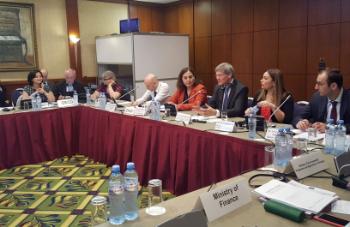
On 16 July 2019, the OECD, jointly with the Georgian Ministry of Economy and Sustainable Development, organised a National Policy Dialogue on Improving Access to Green Finance for Small and Medium-Sized Enterprises in Tbilisi, Georgia.
Small and medium-sized enterprises (SMEs) play an important role in Georgia’s economy. The key sectors where SMEs have a significant environmental impact include food processing, minerals extraction and tourism (hotels and restaurants). Forming the backbone of the economy, SMEs are seen as a major actor in the low-carbon transition in the country.
Although the environmental footprint of individual SMEs may be low, their aggregate impact in many respects exceeds that of large businesses. Reducing pollution and lowering material and energy intensities of SMEs can have a positive impact on the economic and environmental performance of the country. However, scaling-up financing to a low-carbon and energy-efficient SME sector will not happen spontaneously. It will require the government, private investors, producers and consumers to work together to find better solutions to mobilise more effective and efficient green finance opportunities. Given the dominant position of commercial banks in Georgia, they have an important role to play in providing SMEs with access to finance for green investment.
Under the current market conditions, access to finance and banks’ involvement remain constrained. Generally, local commercial banks have established specific environmental credit lines when supported by International Finance Institutions (IFIs) and only a small number continue to offer such products once IFI support is withdrawn. Learning from the design and implementation of such credit lines can provide useful insights into what could be done to increase the capacity and willingness of the banking sector to finance green investments to SMEs.
The OECD has undertaken work in Georgia to understand the challenges associated with scaling up green lending for SMEs. As part of this analysis, the OECD worked closely with the Bank of Georgia, TBC Bank and ProCredit Bank: three banks that are particularly well-positioned to provide insights as they are the largest local financial institutions that have benefitted from IFI-supported environmental credit lines in Georgia.
Objectives of the meeting
Lessons learnt from these banks’ experience with implementing environmental credit lines were the focus of the discussion in Tbilisi. This experience also helped to discuss the ways to address broader policy and regulatory issues related to green finance. The meeting discussed how different partners in Georgia could co-operate to more effectively mobilise private finance for green, low-carbon and energy-efficient investments in the SME sector in the country.
The specific objectives of the meeting were to:
- present and discuss the main findings and conclusions emerging from the analysis of possible ways to improve access to green finance for SMEs in Georgia;
- take stock of relevant initiatives, policy changes and financial vehicles in Georgia that could contribute to scaling up green lending and finance for SMEs;
- identify key challenges and ways forward to better align financial mechanisms with policy reforms to speed and scale up green investments in support of energy-efficient and low-carbon growth contributed by the SME sector.
Participants
- government officials from the Ministries of Environmental Protection and Agriculture, Economy and Sustainable Development, Finance;
- government agencies, such as Georgia’s Innovation and Technology Agency (GITA), Enterprise Georgia;
- business associations;
- representatives of domestic financial institutions;
- the banking sector regulator – National Bank of Georgia;
- IFIs (e.g. European Bank for Reconstruction and Development, European Investment Bank);
- international organisations (EU Delegation to Georgia, UNDP, UNIDO, USAID); and
- academics, consultants, officials from green/climate-related initiatives, NGOs.
Meeting documents:
Summary record from stakeholders meeting
Publication: Access to Green Finance for SMEs in Georgia (English | Georgian)
E-cards: Green Investments for SMEs in Georgia (English | Georgian)
Related documents:
Issue paper – SMEs: Key drivers of Green and Inclusive Growth
Greening Economies in the EU Eastern Neighbourhood: From commitments to results
Environmental Lending in the EU Eastern Partnership Countries
Mobilising finance for climate action in Georgia (Georgian)
Summaries of the EU External Investment Plan: Guarantees
Presentations:
Lessons from commercial banks’ experience with lending to green SME investments in Georgia (Matthew Savage)
EBRD Green Economy Financing Facility in Georgia (Mariam Javakhishvili and George Zurashvili)
Opportunities and barriers to promote SME’s resource efficient and cleaner production financing in Georgia (Tatiana Chernyavskaya)
Mobilising the capital market in Georgia (Prof. Davit Aslanishvili)
Accessing debt capital markets to finance energy investments in the SME sector: Experience from Mexico (Kristian Bruning)
Role of energy service companies (ESCOs) in mobilising finance for green investments in the SME sector (Lars Lunden)
Photos
Photos from the National Policy Dialogue are available on Flickr.






